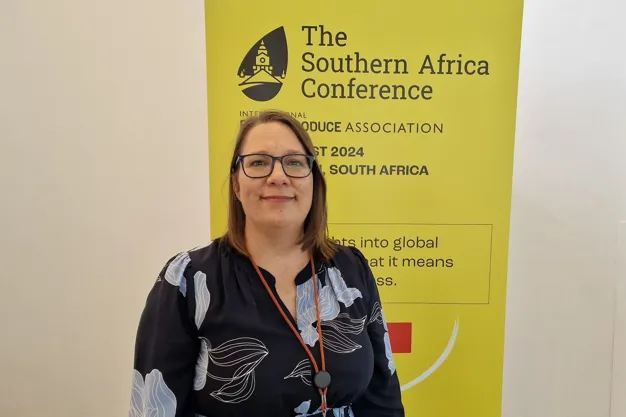No two fruit export seasons are the same. Despite all the planning and preparedness there's just no telling what will take place during very dynamic export seasons. These are some of the key lessons learned by Antoinette van Heerden, Logistical Affairs Manager from the Fresh Produce Exporters Forum in South Africa.
"For FPEF it is business unusual as we plan the exports ahead of a bumper deciduous season that includes pome, stone, table grapes and berries. Last year we had 24 RTG's in use for the 2023 season. Here in Cape Town Port there was up to 16 days delay, with 775 hours lost to wind. This caused 17 vessels who omitted the port. We lost export capacity and empty container supply. We are forced to think and find a divergent strategy guided by our Steering Committee."

Antoinette van Heerden, Logistical Affairs Manager from the Fresh Produce Exporters Forum in South Africa
Van Heerden was speaking at the International Fresh Produce Association South Africa's Fresh Solutions seminar held in Cape Town last week. Audience members included some of South Africa's key fruit export companies and growers.
As the main fresh produce export port of Cape Town, together with Port Elizabeth is seeing the end of the deciduous fruit season and getting ready to switch over to the citrus season, van Heerden says they have done as much planning as possible but were still surprised. "The Cape Town Port at the end of July 2023, had only 15 Rtg's available, seven had engine failure, we quickly had to ramp up our divergent strategy before the start of the deciduous fruit season. If we can get our productivity up-to-date and a world standard we can get two to three extra world shipping services into Cape Town."
She said the big volumes of fruit simply had to get onto ships. Containers were trucked to Port Elizabeth (PE). We had huge volumes this season. The positioning costs of R80 million is a conservative value of the cost to the industry to truck fruit to PE. However, the wind and volume will determine when to go to PE. It is important to have these levers in place. We need to get shipping lines on board too. It places pressure on trucking operators when servicing two ports."
She says the Durban delays also impacted Cape Town Port, which is something new. "For the coming SA citrus season we're looking at how to deal with the delays." Van Heerden says they have set some goals for the deciduous and citrus season that follow right after each other. "We aim to get fruit out of the country. The fruit must spend as little time as possible on the quay. We must have regular arrivals at destination and we must manage costs through visibility."
The fruit industry has seen some positive developments that will help during the next season says van Heerden. This includes the new Transnet Ceo and terminal management, additional staff that were appointed for the 12 hours shifts, their training on the systems as well as the order of new cranes and hauler combinations. Since February the Cape Town Container Terminal has 28 RTG's. All these interventions will hopefully have an impact to increase container movements to get ships loaded more efficiently.
There are however certain unknowns that could impact the citrus export season. "South Africa has national elections on 29 May, we are not sure what the impact will be on state owned entities should a multi-party government be elected. We will have a new minister of transport and we're hoping for a good minister. The effectiveness of the new transport regulator is key too," concluded van Heerden.
For more information:
Antoinette van Heerden
Fresh Produce Exporters Forum
Tel: +27 21 526 04 74
Email: [email protected]
www.fpef.co.za
